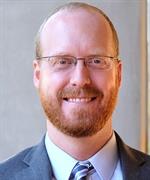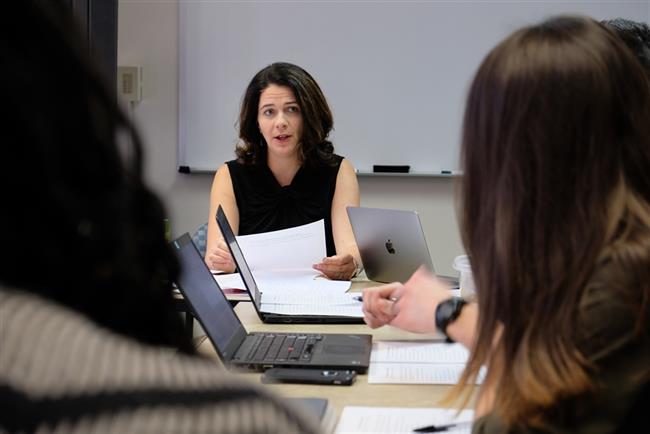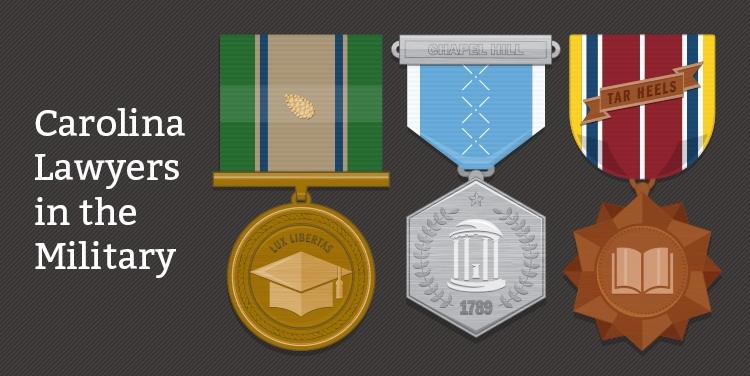This article originally appeared in the February 2018 issue of Carolina Law.
Only a handful of Carolina Law graduates enter the Judge Advocate General Corps each year. Those who do find the work highly gratifying.
Maj. Cal Cunningham '99
![]()
Maj. Cal Cunningham '99
When Maj. Cal Cunningham’99 teaches Green Berets in the Special Operations Command at the Army Special Warfare Center and School about the rules of engagement, he shows a clip from the movie “Lone Survivor.” A four-man unit of Navy SEALs unexpectedly comes upon a goat herder and his two sons. That 3-minute scene as the SEALs run through their legal and ethical options illustrates why all branches of the military value judge advocates.
The herders don’t have rifles: Can they still be deemed combatants? They haven’t done anything hostile yet, so the SEALs can’t shoot. Is an angry look grounds for hostile intent? Tying up the herders to give the SEALs time to escape leaves them to die from animal attacks or cold, and the SEALs would be charged with killing innocent people on the battlefield. But if the SEALs let them go, the herders may go straight to the enemy and put the SEALs in peril.
Doing nothing is not an option, and the highest-ranking SEAL must decide fast.
![]()
Cunningham, right, pictured with John W. Brooker '03 and Terri Erisman '98 in Baghdad, Iraq. Brooker currently serves as deputy staff judge advocate with the U.S. Army Africa/Southern European Task Force, stationed in Vicenza, Italy. Erisman is currently a student in the Army War College at Carlisle, Penn.
“There are different layers of complexity in battle today,” Cunningham says. “The mission is very different from taking territory, like in World War II when you knew the German and Italian armies were the bad guys.”
Firepower alone isn’t the answer in the complex battlefields of the Middle East. Setting up the rule of law and a judicial structure are the foundations of government, Cunningham says. “Engaging with the population to help bring about security so locals can develop governing institutions are the kind of things lawyers are trained for.”
Only a handful of Carolina Law graduates enter the Judge Advocate General Corps each year. Those who do find the work highly gratifying. They know that what they do every day matters.
![Mangual]()
Daniel Mangual '11
Lt. Daniel Mangual '11
“There’s a definite sense of mission in this job,” says Lt. Daniel Mangual ’11, the Navy’s deputy assistant fleet judge advocate in Bahrain. “You know that what you’re doing has a purpose beyond you.”
Only about 12 percent of the U.S. population is eligible to serve (age, poor physical fitness and background checks eliminate many people), and even fewer qualify for JAG. Yet all branches of the military are known for their diversity.
“There’s not one type of Navy judge advocate,” Mangual says. “In the JAG Corps, we want to reflect the fleet, and the fleet reflects America.”
Judge advocates begin practicing law directly with their own clients almost immediately and rotate assignments to gain experience in administrative, operations and trial work. They have the satisfaction of serving their country. If they practice administrative law, they take care of legal matters to reduce the stress of those defending the U.S., both at home and abroad. If they litigate, they either defend the rights of the accused, or they work to weed out those who don’t or can’t conform to life in the military. If they advise commands on operations, they are the ethics watchdogs.
“We’re a law firm, essentially, of 900 attorneys servicing a client base of 325,000 people,” Mangual says.
A law firm with one important difference: JAGs are soldiers, sailors, airmen and marines first.
Jocelyn Mitnaul '14 and Maj. Sunny May Montas '00
![]()
Jocelyn Mitnaul '14
“You’re not just a lawyer; you’re also an airman,” says Jocelyn Mitnaul ’14, an Air Force captain until her medical retirement last year. “You go to basic training before you go to JAG school,” she says, “because if you can’t cut it in one, we won’t send you to the other.”
Maj. Sunny May Montas ’00, the operations officer for the 3rd Marine Expeditionary Brigade, the Marine Corps’ crisis response force in the Pacific, considers herself a Marine first, and then a lawyer. The Marines can assign her to both legal and non-legal jobs, and she has served in Afghanistan in 2004 as an adviser to the Afghan National Army as the U.S. helped stabilize the country after it’s first democratic elections, and again in 2013, when suicide bombers were a regular occurrence. She also was part of rescue efforts after an earthquake and tsunami overwhelmed Japan.
President Ronald Reagan once said, “Some people wonder all their lives if they’ve made a difference. The Marines don’t have that problem.” Montas agrees: “I’ve done something to change the world in my lifetime,” she says. “Not everyone can say that.”
Aspiring judge advocates enter the military in a variety of ways: before college, during or after law school, or after they’ve worked as a lawyer for a few years.
Mitnaul enrolled in the Air Force Academy at age 18. Four years into her five-year active-duty commitment, she won the Air Force’s lone law school scholarship and enrolled in Carolina Law, the Air Force paying her salary all the while. She passed the bar and joined the JAG Corps, and two months later she was in the courtroom, prosecuting her first case.
Before being allowed to prosecute or defend a client at all levels of trial by themselves, Air Force JAGs must be certified by a judge who has observed their work. Mitnaul’s experience on the mock trial team all three years at Carolina led her to be certified in record time. She also gained courtroom experience from her externships at the Wake County Public Defenders Office and the U.S. Attorney’s Office in the Eastern District of North Carolina.
![Sunny May Montas]()
Sunny May Montas '00 in Afghanistan in 2013.
Lt. Col. (P) Judy Boyd '96
![Judy Boyd]()
Judy Boyd '96
Lt. Col. (P) Judy Boyd ’96 received a two-year Reserve Officer Training Corps (ROTC) scholarship as an undergraduate. After she graduated, the Army allowed her to postpone active duty until she finished law school (which she paid for out of her own pocket). She passed the bar and had been working as an intelligence officer for a couple of years when a mentor suggested she join the JAG Corps. She rotated through its development assignments, initially as a prosecutor, before specializing in operational law, accepting international assignments and working in the intelligence community. Her deployments included the conflict in Bosnia, the war on drugs in South America, the ground invasion of Iraq and a year in the demilitarized zone in Korea.
Once Boyd had logged 10 years of active duty, she became a “weekend warrior” in the Army Reserve and worked full time as the deputy associate general counsel for intelligence for the Department of Homeland Security in Washington, D.C. She returned to active duty twice on yearlong mobilizations, first to negotiate for more U.S. troops in Europe and then to help the Afghans on rule of law.
“It’s hard to leave life behind and put family, friends and career on hold for a year,” Boyd says of the deployments, “but it was very rewarding.”
![Michael Richardson]()
Michael Richardson '94
Ret. Col. Mike Richardson '94
Sometimes the military will pay for law school, through its Funded Legal Education Program. Ret. Col. Mike Richardson ’94 recalled applying for FLEP as a Marine Corps tank officer “from a foxhole in the desert, next to my tank in Saudi Arabia, waiting to cross the Kuwaiti border.”
“I didn’t have an application because we couldn’t get 4th-class mail over there,” he says, “so I hand-wrote a letter, and my wife sent in a copy of my transcript.”
During his 27 years in the Marines, 21 of them as a lawyer, Richardson split his time between prosecution and defense before being promoted to judge. The Marines paid for him to acquire an LL.M. in military law, then sent him to Okinawa, Japan, as an officer in charge of a law center, akin to being managing partner of a law firm. He went to Hawaii for a year as a battalion commander, then moved along the West Coast, wherever his assignments took him. Two years ago, he retired from the military and now serves as an administrative law judge for Social Security.
Periodically, he thought about leaving the military to make more money in the private sector, “but I just loved every day of being a JAG,” Richardson says.
“Every time I spoke with my former law school classmates about their billable-hour grind and the work they were doing, I was remotivated,” he says. “My job was fantastic, and most importantly, I was working with people who loved what they were doing and wanted to do it well. There’s no corporate backstabbing — it’s all about teamwork. Plus, you have the opportunity to go places and do things you’ll never do in a civilian law firm.
“I miss it every day.”
![Judy Boyd How to sketch a crime scene]()
Boyd (standing, on right) was part of a team of Afghan and U.S. criminal investigation experts skilled in crime scene forensics and data gathering. The team trained another class of Afghan law enforcement officials to employ cutting-edge techniques that will assist them during prosecutions of accused persons. (U.S. Army Photo by David
Wheeler, USFOR-A)
Lt. J.G. Chidiebere Madu '17
![Chidi Madu]()
Chidiebere Madu '17
Lt. J.G. Chidiebere Madu ’17 commissioned in the Navy a few months before graduating law school last spring. After passing the bar, he spent five weeks in the Navy’s Officer Development School with other young professionals — doctors, dentists, nurses and other health experts — as an orientation to Navy culture and leadership. Then the lawyers were sent to the Naval Justice School in Newport, R.I., for 10 weeks to learn the specifics of what they would do next — legal assistance on non-litigation matters, advising naval commanders and trying court martial cases. Now he’s poised to start his four years of active duty, followed by four years in the Reserve. His first tour will be at the Naval Air Station in Jacksonville, Fla. And he feels ready, in part because of the solid legal education he received at Carolina.
The law school has excellent professors and opportunities for pro bono work, internships and externships says April Giancola, director of public interest advising. The school conducts information sessions on what it’s like to be a JAG officer, often drawing in alumni to interview potential JAG candidates.
The JAG Corps can be a steppingstone to other government agencies or private practice.
“JAG is respected in the legal community,” Giancola says. “It’s a door-opener and a career-shaper. JAG will take young lawyers far professionally and personally.”
The law school also recruits prospective students who have had military experience, says Kelly Podger Smith ’02, associate dean for student affairs.
“They bring maturity, leadership and a different perspective,” she says. “Some look at a law degree as a way to transition back into civilian life.”
Carolina Law students formed VALOR (Veterans Advocacy Legal Organization), a student group that offers pro bono legal services to aid veterans, educate the community and provide a strong network of military-affiliated students and supporters. The law school has a separate veterans legal clinic and a daylong event, Wills for Heroes, co-sponsored by the N.C. Bar Association, to help veterans with legal paperwork.
A military career has many benefits not available in the private sector. Montas, the Marines operations officer, advises young lawyers to look beyond the pay scale. In addition to the base salary, the military gives housing and food allowances that aren’t taxable, and will pay for additional education, such as an LL.M. for Montas. She and her family receive free health care, and when she retires, she will receive a pension of half her full salary.
And there’s the travel. Montas’ career has taken her to Australia, Bali, Borneo, Cambodia, Malaysia, the Philippines, Thailand and other exotic spots, places she wouldn’t have gone to had she had to pay for it herself.
The work assignments change, too.
“Each job challenges me academically and athletically,” she says. “I’m constantly sharpening the knife.”
Participating in world affairs and some of the most complicated challenges the U.S. faces ultimately compelled Cunningham to enlist. Joining the military was “an important way to contribute to our nation’s influence in the world,” he says. (He joined the Navy initially, but after 9/11 transferred to the Army because “the bad guys were on land not at sea.”)
Since then, he has participated in remarkable events that will be remembered in history, alongside some of the best and brightest people who have made personal sacrifices for the greater good. In Afghanistan, he practiced contract and fiscal law, which can sound mind-numbingly dry, he says, but, “I was also a key part of the operational decision-making: reviewing combat operations plans, advising commanders in real time on rules of engagement, the laws of war, on what to do with detainees and how to comply with our international obligations while in combat.”
What do you do with a detainee who is not complying with the laws of armed conflict? Do you classify detainees as either prisoners of war or unlawful combatants and does it matter? How do you create government institutions? How do you make nuanced decisions about application of force?
That complex environment, Cunningham says, is well-suited for the analytical tools that lawyers bring to their jobs every day.
-January 25, 2018



































